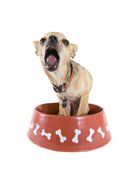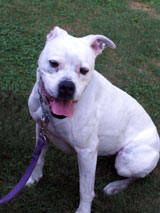 |
 | 
|
How to Avoid Dog Food Allergies?Buy Hypoallergenic Dog Food Or Make Your OwnDog food allergies are one of the things that pet owners need to watch out for. Dogs, like people, are allergic to a number of foods. Buy hypoallergenic dog food, or better yet, make homemade dogfood. Dogs are man's (and woman's) best friend. People love to pamper their dogs, and most of them are very protective of their pets. Owners of dogs are often willing to go to extra trouble and spend a good deal of money in order to keep their pets happy and healthy. And of all the many things that are spent on canines, pet food and treats makes up the biggest percentage of the overall expense. If you discover your pooch behaving in an unusual manner, such as like scratching, licking or biting its paws, or pawing the area around its face and ears, then it is possible that your canine may be suffering from allergies. The first thing to do is to bring your pet to a veterinarian and have him or her checked out. If the problem is allergies, there are medications you can give your canine to stop the itchiness and prevent the allergy from spreading (or from becoming infected if the pooch won't leave the skin alone). Why are Dog Food Allergies Increasing?Dog food allergies are increasingly found in dogs because we use more commercially prepared food for our pets, instead of natural or organic homemade dogfood. Dog food generally consists of lamb, meat, chicken, dairy products, eggs, wheat, whey, pork, soy and fish. It would be easy to assume that these ingredients were responsible for causing dog food allergies, but in all likelihood it's not usually the regular ingredients that are causing the problem, but rather the chemicals and other additives that are added to the food to prolong its shelf life and/or to extend the product. One noteworthy example of this occurred during the early months of 2007, when there was a pet food recall all over the nation. It was then discovered that a chemical called melamine had been added to dog foods, and had been responsible for causing the illness and death of a number of dogs. In order to prevent further allergies and possible illnesses to your pets, it's important to take extra care in choosing what kind of food you give them. Fortunately, there are many choices available that can help avoid the dangers of dog food allergies. For example, you can purchase special brands of hypoallergenic dog food from your veterinarian. Although these specialized pet foods may cost a little extra, they're usually far healthier for your pets to eat. And because they're healthier, presumably you'll save money on vet bills. Alternatively, there's the option of preparing your pet's food yourself. Using Homemade DogfoodBy preparing your own homemade dogfood, you are not only ensuring your dog's health but, at the same time, you're taking a step towards protecting the earth (by using less chemicals and more natural, or even organic, ingredients). An additional benefit is that by preparing your own pet food you will also have less non-biodegradable waste; you will not have the empty cans or food bags to dispose of. One of best parts of preparing your own dog food is knowing exactly what your pet is eating. You won't have to worry about any questionable or artificial ingredients tainting your dog's food. Dog Allergy TreatmentThe first step in treating dog food allergies, is to try and identify the allergen in the food. Usually the only way you can find that out is by isolating the type of food you provide. Change the food or provide homemade food with only one or two ingredients. If your canine does not develop allergies after several weeks of eating a limited (but hopefully still nutritious) diet then add another food group, and so on. You could also try this isolation method by switching commercial food products with hypoallergenic products and see if your dog's allergy symptoms go away. This method is trial and error, and although it might take a little time, it's worth the trouble in order to find out what is really safe for your dog to eat. It is not that hard to prepare your own homemade pet food. In a way, it's not much different from cooking for another person in the house. Be very observant of what you put in your dog's food. To keep him or her healthier you can add omega 3, 6 and 9 fatty acids, which helps to keep your dog's skin and coat healthy. You can also add simple food additives to your dog's food to ensure that your pet gets all the nutrients needed. Using all natural and, if possible, organic ingredients in your dog's food will prolong your pet's life and make him or her healthier. This is an effective way of ensuring that your pet avoids suffering from dog food allergies. Product Recommendations for Dog Food AllergiesOnce your pooch develops food allergy symptoms, he or she will experience some discomfort. While treating the symptoms is not the same as identifying and treating the cause, you can help your pet cope better with the itching, swelling and discomfort. We recommend PetAlive Allergy Itch Ease for treating your dog's symptoms but only start treatment once you have found the cause of the allergic reaction (as treatment can hide the cause of the reaction). Allergy Itch Ease is a herbal remedy that temporarily relieves skin allergies and itch. Ask the veterinarian about your dog's allergies and treatments before starting to use natural remedies. Return to top of How to Avoid Dog Food Allergies? Return to The Dog Biscuit Home Page. | Related Articles
Dog Allergies Need to be Diagnosed and Treated Dog Allergy Treatment Effective canine allergy treatment focuses first on the cause of the symptoms. Dog Allergy Symptoms What are the common symptoms of allergies in dogs? Dog Food Allergies Just like humans, some dogs can also be allergic to food. Find out more. Dog Skin Allergies Understand what causes (and how to treat) canine allergies, particularly skin allergies.       | |
|
Enjoy This Site?
Then why not use the button below, to add us to your favorite bookmarking service? | ||
|
| Home | About
| Contact | Sitemap
| What's New
|Privacy Policy |
This site is for informational purposes only. If you have an issue with your dog's health, please see your vet.
Website design by Webmidwife.com | ||
| | ||







